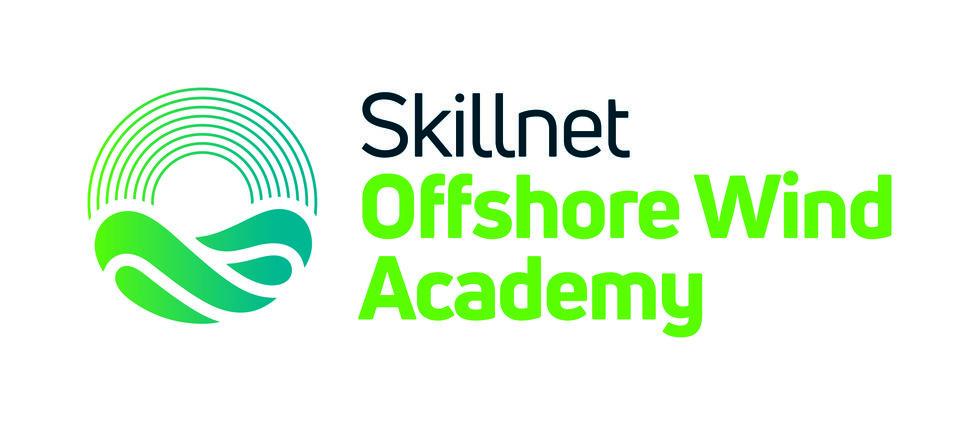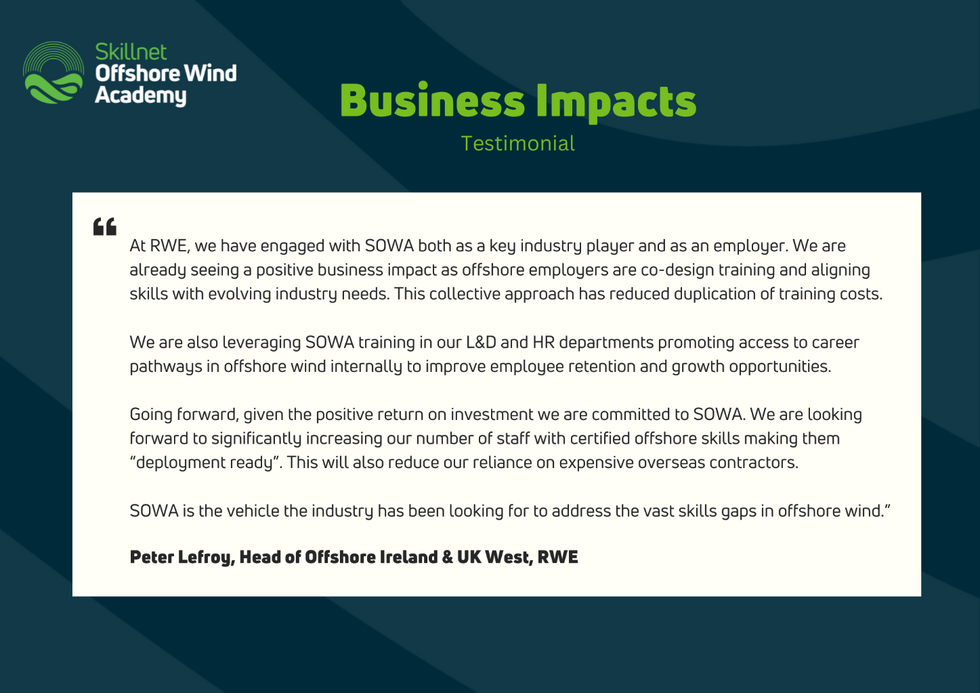 About Us
About Us
Skillnet Offshore Wind Academy is Ireland’s national upskilling initiative for the offshore wind energy sector. We provide specialist training and accredited micro-credentials designed to equip professionals with the skills needed to succeed in one of the fastest-growing renewable energy industries. Our courses deliver practical, industry-aligned micro-credential courses that support Ireland’s clean energy goals. By combining expert instructors with industry-relevant content and case-studies on the Irish context, we help learners and companies alike build the skills needed to succeed in offshore wind projects in Ireland.
With Ireland’s offshore wind industry growing rapidly, demand for skilled professionals has never been higher. Skillnet Offshore Wind Academy combines expert-led instruction with hands-on learning, covering key areas such as wind farm development, metocean analysis, environmental assessment, engineering, project management, and high-voltage systems. We are always open to developing new courses in emerging areas of demand, based on trends highlighted by industry, ensuring our training remains relevant, up-to-date, and aligned with the needs of the sector. Explore our micro-credential programmes below – each developed in collaboration with leading universities and industry partners, and stackable towards further qualifications.


Micro-Credentials 2025/26
1. Fundamentals of Offshore Wind
This course provides a comprehensive overview of the offshore wind sector, offering insight into the technology, economics, and regulatory landscape that drives this rapidly growing industry. Participants will explore turbine technology, site assessment, grid integration, operational management, alongside environmental and social impacts of offshore wind projects. Designed for professionals new to the sector or those transitioning from onshore wind/renewables/a related industry wanting to formalise their existing experience - this course provides a solid foundation for a career in offshore wind. Read more
2. Project Management for Offshore Projects
Offshore wind projects involve complex logistics, multiple stakeholders, and strict regulatory requirements. This course equips participants with essential project management tools and techniques tailored specifically to offshore environments. Topics include project planning, risk management, resource allocation, budgeting, and stakeholder communication. Learners will also explore real-world offshore project case studies to develop practical strategies for managing timelines, costs, and safety standards when leading offshore wind projects from conception to completion. Read more
3. Introduction to Metocean for Offshore Wind
Understanding metocean conditions is critical to the design, development, and operation of offshore wind farms. This course introduces learners to the fundamentals of meteorology and oceanography, including wind, wave, and tidal patterns, as well as their impact on offshore structures. Participants will gain practical knowledge in interpreting metocean data and applying it to site assessment and project planning. By combining theoretical knowledge with industry-relevant case studies, this course equips professionals with the skills to assess risks and optimise offshore wind projects effectively. Read more
4. Introduction to Geology and Geophysics for Offshore Wind
Understanding the seabed and sub-surface conditions is essential for safe and efficient offshore wind development. This course introduces key principles of geology and geophysics, including sedimentology, seabed mapping, and geophysical survey techniques. Learners will gain practical knowledge on how geological and geophysical data inform site selection, foundation design, and construction planning. By combining theoretical instruction with real-world examples, participants will be able to assess risks and make informed decisions throughout the project lifecycle. Read more
5. Certificate in the Safe Operation of Offshore High Voltage Power Systems
High-voltage systems are essential for transmitting electricity from offshore wind farms to onshore grids. This course covers the design, operation, and safety of offshore high-voltage power systems. Participants will learn about electrical components, system integration, fault management, and regulatory compliance. The course combines theoretical knowledge with practical examples, enabling learners to manage high-voltage systems safely and efficiently in offshore environments. Read more
6. Metocean Programming and Data Analysis
Processing and interpreting metocean data is vital for project planning and risk assessment. This course teaches participants how to programme and analyse data related to wind, waves, tides, and currents. Learners will gain hands-on experience using programming tools to process large datasets, perform statistical analysis, and visualise trends. By understanding how to apply metocean data to real-world offshore projects, participants can support decision-making, optimise designs, and improve operational safety. Read more
7. Introduction to Geographical Information Systems (GIS)
Geographical Information Systems (GIS) play a crucial role in planning, monitoring, and managing offshore wind projects. This course introduces participants to the fundamentals of GIS, including spatial data analysis, mapping, and geospatial tools. Learners will explore practical applications of GIS in site selection, environmental assessments, and resource management. By the end of the course, participants will have the skills to integrate GIS into offshore wind projects, enhancing decision-making and operational efficiency. Read more
8. Ornithology for Offshore Wind
Bird ecology and behaviour must be understood to assess potential impacts of offshore wind farms. This course provides a detailed introduction to ornithology, covering bird identification, habitat assessment, and survey techniques. Learners will explore how to integrate avian data into environmental assessments and mitigation planning. With practical examples and case studies, this course equips professionals with the skills to monitor and manage avian populations effectively during offshore wind development. Read more
9. Environmental Impact Assessments (EIA) for Marine Renewable Energy Developments
Environmental Impact Assessments (EIA) are a legal requirement for offshore renewable projects. This course provides participants with an in-depth understanding of the EIA process, including baseline data collection, impact assessment, and report preparation. Learners will explore environmental legislation, stakeholder engagement, and mitigation strategies specific to marine energy projects. By completing this course, professionals will be equipped to support EIAs that ensure projects meet regulatory and sustainability standards. Read more
10. Certificate in Nautical Studies – Officer of the Watch and Master on ships of less than 500GT
Vessel operations are critical in supporting offshore wind activities. This course provides Officer of the Watch (OOW) and Master certification for ships under 500 gross tonnes. Participants will develop navigation, ship handling, safety management, and regulatory compliance skills required for offshore operations. The course prepares learners for practical responsibilities at sea, ensuring safe and efficient vessel operations in support of offshore wind projects. Read more
11. JNCC MMO Marine Mammal Observation
Environmental compliance is essential in offshore wind development, particularly regarding marine mammals. This course trains participants in monitoring marine mammals during offshore operations. Learners will gain practical skills in observation, data recording, and reporting, aligned with JNCC standards. The course also covers behavioural patterns, species identification, and mitigation strategies to minimise environmental impacts. Completing this course equips professionals with the expertise needed for MMO roles on offshore projects. Read more
12. ACCOBAMS MMO PAM Certificate
Passive Acoustic Monitoring (PAM) is a critical tool for protecting marine mammals during offshore construction. This course provides training on PAM techniques, equipment, and data interpretation, aligned with ACCOBAMS guidelines. Participants will learn how to implement acoustic monitoring programmes, analyse acoustic signals, and ensure compliance with environmental regulations. By completing this certificate, learners become qualified to contribute to environmental monitoring and mitigation strategies in offshore wind projects. Read more
13. Engineering for Offshore Renewables
Offshore renewable energy systems require specialised engineering knowledge. This course explores the design, construction, and operation of offshore energy infrastructure, focusing on turbines, foundations, and grid connections. Participants will learn about structural engineering principles, load calculations, materials selection, and maintenance strategies. The course also addresses safety, environmental compliance, and risk management, providing learners with a holistic understanding of engineering challenges in offshore renewables. By completing this course, professionals can contribute effectively to the design and management of offshore energy projects. Read more


